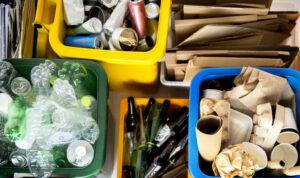The UK must scale up recycling of materials for low carbon industries or risk facing a critical shortage of key metals, a new report warns.
The projected use of lithium, cobalt, silver and rare earth elements by the UK’s low carbon industries over the coming decades is set to soar. China controls 60% of global mine production and 40% of rare earth metal reserves, raising fears of a significant threat to the supply chain for businesses.
But the thinktank Green Alliance said the UK could limit the threat by building up domestic recycling of valuable materials and reducing energy use.
A rapid scaleup of the recycling of green products and their components would result in almost all critical raw material demand for electric vehicle batteries, wind turbines and solar panels being met from secondary materials by 2050, the report said.
Susan Evans, senior policy adviser of Green Alliance, said: “With net zero, there’s also a big opportunity for the UK to become much more resilient and self-sufficient.
“By investing in making our homes more efficient and improving public transport, we can cut the amount of energy we need to use and, therefore, reduce our reliance on imported critical raw materials.
“This is also about ending needless waste. It would mean keeping these valuable materials in use, creating jobs in new recycling industries, and lowering household energy bills at the same time.”
In 2019 the country’s small fleet of electric cars contained more than 1,400 tons of lithium and 800 tons of cobalt, worth £26.3m and £31.5m respectively. Green Alliance’s analysis suggests, if recycled, that volume of lithium and cobalt would be enough to make 220,000 batteries for electric cars, or 10% of projected new sales in 2035.
The opportunity for using secondary materials will increase as the number of electric vehicles increases. Adopting a circular economy in the raw materials could contribute to jobs and cut dependence on China for critical raw materials.
By cutting energy demand and introducing measures such as insulating homes, increasing car sharing, increasing the use of public transport and walking and cycling, the UK could halve its use of some critical resources by 2030.
“By also scaling up recovery and reprocessing, through circular economy approaches, an increasing share of remaining demand could be met with secondary materials, resulting in less environmental damage,” the report said. “This would allow the UK to retain and maximise the value of critical raw materials, build more resilient supply chains and create good jobs across the country, contributing to both the levelling up and green recovery agendas.”
Mining, processing and refining of the critical raw materials – such as lithium for a low carbon economy – can cause considerable environmental and social harm, run counter to goals on climate change, biodiversity and human rights, the report said.
“The UK should adopt a strategy to ensure long-term supplies of critical raw materials that prioritises both energy demand reduction and circular economy approaches. Under this strategy, primary extraction would be the higher risk, last resort option to meet industry’s requirements,” the report said.
Tom Tugendhat, Conservative MP for Tonbridge and Malling, said: “We know China dominates the processing of rare earths. But, as Green Alliance point out in this important report, the UK can significantly reduce supply chain risks by creating a proper plan to recycle net zero products like solar panels and electric vehicles, as well as being smarter with our energy use.”
Read more:
UK must boost recycling of materials for green industries














